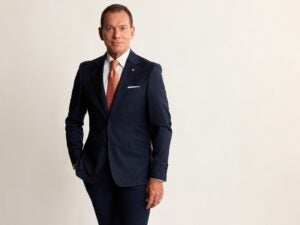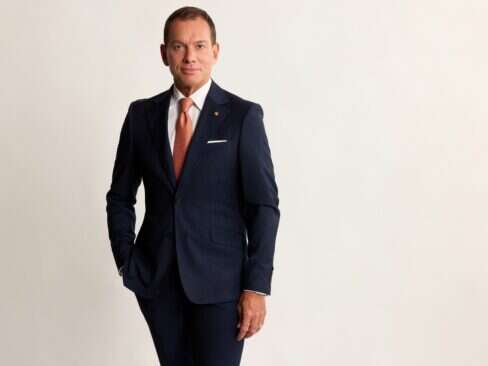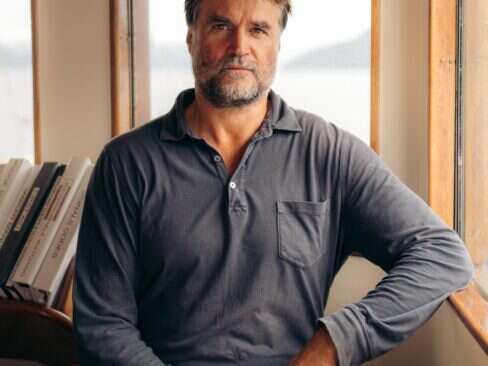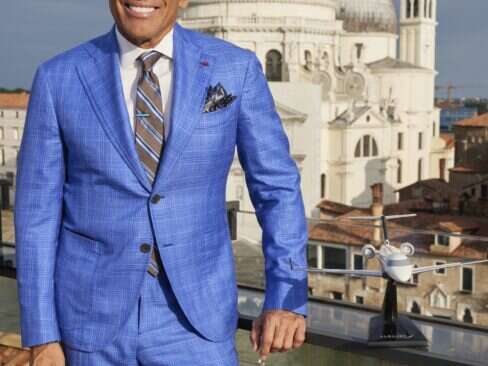Marc Riccio’s nearly two decades in senior level positions for the New York Jets of the National Football League gave him a skybox view on how powerful entertainment is for building client relationships and closing deals. He also saw first hand how the complexity of staging experiential events made budgeting difficult and how increasing prices often made it cost prohibitive for all but the largest of companies to roll out the red carpet for their customers at high profile events. With an enviable Rolodex and powerful backers he believes LXL Sports & Entertainment Lifestyle will be a disrupter in the hospitality segment. Recently Elite Traveler Editor-in-Chief Doug Gollan visited Riccio (below, second from the right) at the Manhattan headquarters of the start-up.
Elite Traveler: What’s your background?
Mark Riccio: I left the Jets in October. During my time there, I had run almost all aspects of the business operations, with the exception of tickets and personal seat licensing. So I’d run sponsorship, media, advertising, stadium development, and all of the events and marketing programs that came out of that. I’d run our production group for a stretch as well, and certainly I had run, built, and operated our suite sales and service business for several years. It was clearly one of the more challenging aspects of the sports business, but we also saw a great opportunity in that. There’s a great need for that, and it’s a great experience being able to go to a large sporting event or concert and be in a luxury environment around friends and family. It’s a fantastic experience.
ET: Where did the idea of LXL Entertainment come from?
MR: After I left the Jets, I was connected to our three investors through the Core Club. They were working on this project that was about big experiences, but it wasn’t getting traction because they didn’t have the infrastructure in place, or brand long-term vision. We had several meetings, and coming out of that they asked me if I wanted to take this project and run with it, which I did because I saw the opportunity in it.
I saw also an opportunity in that there are a lot of people, high net worth individuals, affluent people, and companies that have a need and desire for a premium experience—not just the game—but an experience. To achieve that, they had to spend more than they wanted to financially or they could afford it, but then they had lots of assets they didn’t need.
ET: What do you mean?
MR: Maybe they had more tickets than they could actually manage and use effectively, or they got access to elements that just didn’t have as much value to them. Someone would be a Jets fan, but they had clients that were Giants fans, or customers and clients who were fans of Broadway, or culinary, or fashion. The next thing you know you’re in for high six, low seven figures plus the time or energy to curate a great experience. It’s not just about a ticket. You want to be around interesting people, have great food and beverage, and be around other like-minded people.
ET: Where are you in getting the business started?
MR: Our first meeting was in December of 2013, and in January we shook hands and agreed. From January, in the first 60-90 days my recommendation was that we need to build infrastructure, brand, business plans, research, defining our market, defining our value proposition, what is our product going to be, what is the price point? Beyond that, what makes us special? What are we doing that makes us different in providing that high-level luxury experience? We intuitively knew that from our experiences from building businesses.
ET: Who are your investors?
MR: One is from HSBC, Robert Lipps (far left above). The other two, Steve Zelin (second from left) and Dave Blitzer (far right) are at the Blackstone Group. They’re senior executives at their companies. Dave is also a co-owner of the New Jersey Devils, the Prudential Center, and the Philadelphia 76ers, and they also just bought stake in the Yankees AAA team. So they clearly knew sports, they knew how to build the business, and they knew the entertainment landscape, being in the environment they are in.
ET: What’s the vision?
MR: The vision is a luxury solution around a high-end business, entertainment, and lifestyle cluster experience. We built the infrastructure from the first 60-90 days, and then we hit go. Our first experience was on August 25th, 2014, and we did opening day at the U.S. Open Tennis Center, and had a luxury suite with Jim Courier as our special guest, three-time Grand Slam champion. The architecture around our events is always great content, first and foremost. Great sporting experiences like the U.S. Open, great media, television, comedy, fashion, culinary, as well as top-shelf food and beverage, fantastic gifts for people, not just tchotchke bags, but something with real and perceived value.
ET: Walk us through what you did at the U.S. Open with Jim Courier. Who came, and what companies were you dealing with?
MR: What makes us unique is this: You can get a lot of things with time and money. You can secure tickets to a game, you can secure a luxury suite, you can secure athletes and talent. It’s just time and money. What we’ve created is not just about the ticket, or the suite, or the athlete or talent. That’s clearly part of it, but it’s about the experience. It’s an end-to-end solution in an all-inclusive membership model.
We had 22 guests there, we had eight different companies that were there in groups of two and three, and each one of those companies in and of themselves could have purchased and created the whole experience themselves. They had the financial wherewithal to do that. These companies need and want that C-Level experience. They’re talking to the C-Suite, they’re talking to high net-worth. That’s the world that they live in. They socialize in this space and they do business in this space. For each one of those companies to come and purchase and create this experience is time and money. Then also they would have to get 20 people to match up, family and friends, personally or professionally. For a lot of people that doesn’t work. Whereas to our events they come in twos and threes and fours and the experience is shared—and this is a collaborative economy, a shared economy, whether that means sharing luxury assets or otherwise—you want to share that with likeminded people. That’s what this is all about.
ET: How was the response?
MR: What we have found is that there is an absolute demand for this. It serves different purposes for different people. Beyond that, it’s the customer service experience. There’s the concierge component of holding your hand as a guest, a member service component from start to finish. Even at the first event, someone cancelled, someone forgot tickets. Normally that puts the burden on whoever is executing the experience, either personally or professionally. Instead, we solve all of those problems. If there’s a guest that wants a bottle of Belvedere instead of Ketel One, we’ll take care of that. You’re not getting nickel and dimed.
ET: It sounds like your background is a big plus?
MR: From a luxury standpoint and clearly for this type of purchase—and this goes back to my Jets days—the factors that impact people’s decisions are confidence in the people—who are you? Clearly both my experience and that of my colleagues and investors gives them confidence. We have a strong understanding of the space. We have found that we are providing a solution for the modern luxury buyer.
ET: And after the U.S. Open?
MR: The next experience was at Yankee Stadium with Mariano Rivera. Similar components: great content, great terms, great gifts. People were getting a framed picture of them with Mariano Rivera sent to them in the next week at their home or place of work. Our third experience, this past October, was at the Paley Center for Media. We participated in a panel with the cast and executive producer of Law and Order SVU. Then we had a private after-party for just our members and guests afterwards—a totally non-sports experience. The next experience was at Niketown. We took over the fifth floor of Nike ID studios with Paul Goldschmit, first baseman of Arizona Diamondbacks. Guests could create their own sneakers, they went shopping, got great gifts, and had a great experience around family. That one filled up very fast, because it’s family.
ET: What’s the mix between sports and non-sports?
MR: The key positioning is: sports is only about half of what we do, the other half is non-sports. It’s about creating experiences that’s also beyond games, so we’ll do a lot around fashion, culinary, family. That’s all part of Q1, Q2, Q3, Q4, and into next year.
ET: How do you buy the product?
MR: The model is, you pay $6,250 a month, and receive 38 “credentials”—equivalent to one ticket for one person for one event. You pay each month and it’s all-inclusive. No additional costs. Everything is taken care of. So it’s about 2,000 dollars a head for whatever experience you and your clients want to do. That’s where the value certainty and cost certainty comes in. Two-thousand dollars per person per experience is somewhat of a premium, but admittedly it still has a fantastic value to smart decisions around your luxury experiences, because everything is curated, everything is done for you, you have the highest level of flexibility, and you can cancel at any moment in time if you don’t feel like you’re getting the value. We’re so confident that we will deliver against the value proposition and the experience will be fantastic that we’ve gone to a monthly model and people have embraced that.
ET: Are there other options if people want to do more or less?
MR: We will provide people the opportunity to take a greater position if they have that need. Time will tell. We do believe for some that will be the case.
ET: How far out are experiences on the calendar?
MR: We will have a full year in advance, with the clear recognition that past six months ahead there is some flexibility due to sports schedules being set and concert dates added to the calendar. We will target lifestyle clusters and expectations within those months. We’ll have anywhere from two to five events per month. There will be an assortment of experiences bas on culinary, fashion, music, and entertainment.
ET: Are all the events in New York?
MR: For now, yes, for several reasons. If you launch a luxury premium product, there’s no better place to do it than New York in terms of potential members and great opportunities and great experiences. The vision is that after this year and next year to launch in two to three markets successively over the next five years, and we’ve done preliminary research on that to outline those opportunities in L.A., San Francisco, Chicago, Dallas-Fort Worth, and Houston. Theoretically, if you were a member in New York could you use credentials in L.A.? That is the thinking, absolutely. Going from this great concept around what we’re building, we do have members and experiences and we’ve become real, but we’ll have to pivot and work within the marketplace. We’ve learned that in terms of senior executives in the luxury space in premium opportunities, we are bi-coastal. So much goes between L.A. and here. That will probably be the first market that we move to.
ET: Can you can gift the credentials?
MR: You can do it on a very individual basis. If you have a business associate who’s a big fan of wonderful red wine and great chocolates, which is an experience we’re going to do, and you know that interests them and their spouse, what better way to make an impact with them? The mission is creating memorable experiences. And the best way to do that is to let someone have something they value and that’s going to be an awesome thing.
ET: Is there a cap on membership based on number of events?
MR: Right now we’re only taking forty members, over this year and into next year, then we’ll take it from there. We want to maintain a high level of experience first and foremost. And we want to move in lock step with membership, because the market always wins. As their needs and desires present themselves, we’ll have the ability to deliver that.
ET: What comes after the forty members?
MR: At that point we’ll stop and pause at that moment in time and evaluate not only our membership but also our calendar and value experiences against that.
ET: Who do you see as the target?
MR: I think the mix will be a combination of both, and this is resonating with the higher end of private companies that have a need for high-end entertainment, the need for an end-to-end solution for entertaining their C-Level executives, clients, and family. There are a lot of high net-worth individuals that will make this decision once they’ve seen this, that it both fits an important business function and a personal value. And also an aspirational and emotional value, both personally and professionally. That’s the sweet spot. Private Equity, Investment Banking, Accountants, Lawyers, and other higher end professional services, technology, Commercial real estate (are the target).
ET: Anything else you’d like to add?
MR: If we grow too fast, we might jeopardize the experience. We’ve got to deliver a fantastic luxury experience from end-to-end. We’ve been able to do that, and we’ve got all the confidence in the world that we’ll continue to do that, but we need to limit membership opportunity and then grow from there, smartly both whether that’s in New York or in other markets. Most people go through the value proposition and the solution aspect, and the common theme is: ‘Ah, I get it. It makes sense. You’re providing a solution to the modern luxury buyer.’










